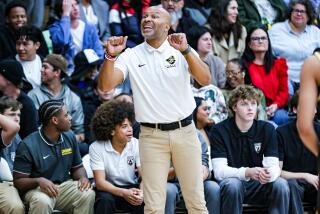Spotlight Is Burning Brighter on Athletes
- Share via
The world of sports journalism keeps changing, with growing numbers of teenage athletes being treated as celebrities.
In Southern California, a record number of high school football games will be televised on cable or broadcast on radio and via the Internet. Santa Ana Calvary Chapel has worked out a deal in which every varsity football game it plays this season will run on Orange County cable stations.
In addition to broadcasting a weekly football game, FSN West 2 has started a Friday night highlight show at 11 p.m., competing with shows already seen in Orange and Ventura counties.
Let this be a warning to teenage athletes and their parents: Along with the positives, you must be prepared to deal with the negatives associated with increased media scrutiny.
Those in the media spotlight for the first time need to understand what’s at stake.
Athletes must assume additional responsibilities. Those who break the law or make an error in judgment will quickly find their names in headlines, something that might not have happened if they were not athletes.
It’s the blessing and the curse of America’s obsession with sports.
Just ask LeBron James, whose basketball exploits became such big news that driving a Hummer as a senior in high school received national attention.
With all the great performances we’ll see this school year, there’s bound to be some instances when an athlete will be the focal point of unflattering news. It’s now part of the landscape.
About this time last year, for example, Randy Estes of Los Alamitos was considered among the top football recruits in the nation. His picture was included in national sports publications and on Internet recruiting sites along with stories extolling his play as a defensive back.
Then, seemingly in a flash, the headlines turned negative. He was picked up by police on drug allegations and suspended from his high school team in the middle of his senior season.
The can’t-miss football prospect was suddenly a young man in trouble.
There are demands and expectations for those who become sports standouts.
During the summer, Gatorade brought to Hollywood its prep players of the year by sport in a setting like the Heisman Trophy ceremony to honor its national athlete of the year.
One of the presenters was Indianapolis Colt quarterback Peyton Manning, who gained his own mass following in high school. Fortunately, he made it through the sometimes circus-like atmosphere, emerging as a respected, down-to-earth spokesman for what sports success can provide -- besides financial rewards.
“You have to keep track of what your priorities are,” Manning said. “The reason these athletes are here is because they’ve always taken care of business on and off the field. There’s no question it’s challenging managing your time. The awards and attention are flattering, but you can never lose sight of how you got there.”
Manning made it clear that a teenage athlete won’t get through a media onslaught without help.
“My parents were there for me, but for other kids, it can be your teacher, a counselor, a coach, someone there to support you or be a buffer,” he said. “I’ve always said high school sports is one of the greatest institutions around.”
The winner of the Gatorade national award was basketball standout Dwight Howard, the No. 1 pick in the NBA draft from Atlanta. He didn’t seem fazed by the lights, cameras and attention focused on him at the tender age of 18.
“It’s made me look at things with a different perspective,” he said. “A lot of people try to get the bad things out of me. They’re not always out for my best interests, so I have to know the people who are good and the people who are bad.”
Howard said he made a choice to sacrifice some teenage experiences for the chance to realize his dream of playing in the NBA.
“By sacrifice, I mean I gave up the parties, the clubs, doing all the things a normal teenager would do for fun,” he said. “My fun came on the court. I wanted to be the best high school player in the nation. I worked at it every day.”
Jeff Byers, an offensive lineman from Colorado who’s now a freshman center at USC, was recognized as the No. 1 prep lineman in America. It led to numerous phone calls from media during the recruiting process. He didn’t let it influence his performance.
“For me, the media attention is not why I play the game,” he said. “If you play it for that, you’re playing for the wrong reason. You can’t let the media change you. You have to be the person you are and play the game for yourself and your team.”
Byers said his friends and high school coach made sure his ego didn’t become too big.
“I had friends who always pushed me,” he said. “They wanted me to get better. My coach didn’t treat me as an All-American. He treated me like an incoming freshman who was always working his butt off.
“As a high school athlete, you’re not near the peak of your potential. It’s crazy to think you’re the greatest, because obviously you’re not. There are grown men that can whip you any day.”
Seeing your name in the sports section or mentioned on television is part of the high school athletic experience. For many, it’s the only time they’ll be treated as public figures. It can create memories that will be fondly looked back on when they become grandfathers or grandmothers.
It’s a fun time that soon ends, so enjoy it while it lasts -- and be careful.
Eric Sondheimer can be reached at eric.sondheimer@latimes.com.
More to Read
Go beyond the scoreboard
Get the latest on L.A.'s teams in the daily Sports Report newsletter.
You may occasionally receive promotional content from the Los Angeles Times.











